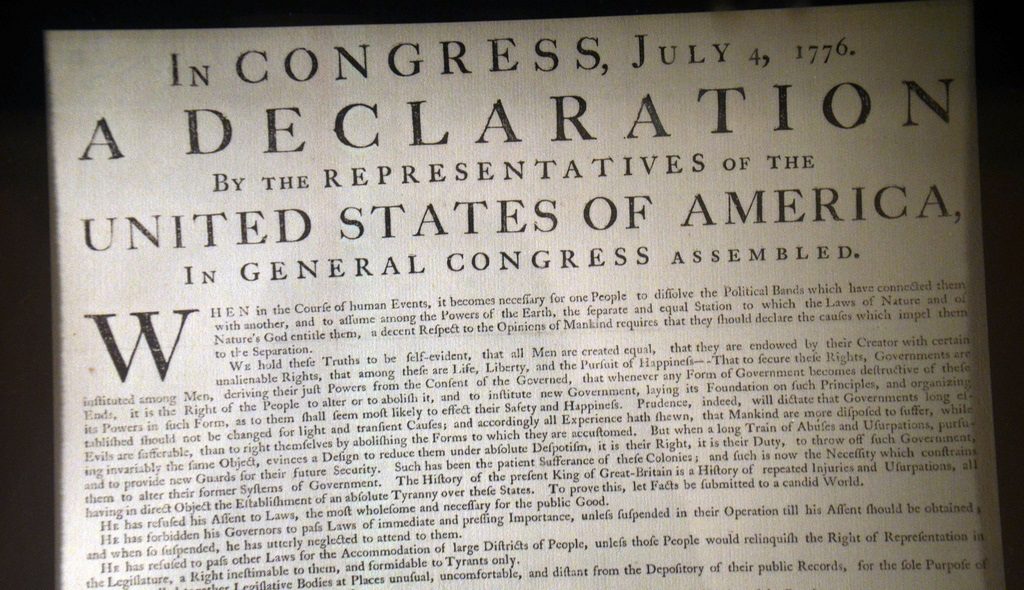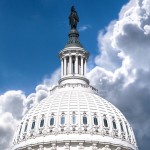When he became president of Princeton University in 2013, Christopher Eisgruber began a new program called the Princeton Pre-read. Each summer the university assigns the incoming freshmen a book selected by the president. Then he, some faculty members, and (if possible) the author of the book discuss it with students soon after their arrival. Other programs throughout the academic year feature further discussion of the book.
This year the Pre-read for the class of 2020 is Danielle Allen’s Our Declaration: A Reading of the Declaration of Independence in Defense of Equality (2014). Allen, a 1993 graduate of Princeton, is a very accomplished classicist and political theorist. She is currently the director of the Safra Center for Ethics at Harvard University and a regular contributor to the opinion page of the Washington Post. Our Declaration is, in her own words, a “close reading” of the document that stands first among the organic laws of the United States. President Eisgruber chose wisely, for Allen’s book is consistently thought-provoking, as a Pre-read should be.
And there is much more to praise in this book. First there is the charm of the writing: winsome, honest, persistent without tedium, infectiously enthusiastic. This is the writing of a gifted teacher, making ideas accessible in an imaginative way. There is a good deal of learning here, “worn lightly” as the saying goes, through fifty succinct chapters in fewer than 300 pages. Part II in particular is superb ground-level history, explaining how the Declaration of Independence became the text we know through a process of “group writing.”
Allen also demonstrates an admirable seriousness about the power of words and the ideas they express. She evinces not a trace of cynicism or snark—so fashionable nowadays—about the capture of politics by self-interest. But neither is she a Pollyanna about democratic politics. She manages instead to be deeply patriotic without any jingoism or triumphalism. One can fairly surmise that as a woman of the center-left in contemporary politics, Allen wrote this book to stake a liberal’s claim to the founding principles that have long featured so centrally in modern American conservatism. For this, she should be congratulated, since the academic left’s recent drift toward postmodern radicalism has put it at odds with the principles of the country’s founding.
Start your day with Public Discourse
Sign up and get our daily essays sent straight to your inbox.Nonetheless, there is a fly in the ointment here. Allen clearly grasps what “self-evident” means in the crucial second paragraph of the Declaration: “All the evidence you need to judge the proposition for yourself is in the proposition itself.” Yet she never supplies an account of the Declaration’s (and her own) central idea—equality—that gives us any reason to believe this first and most fundamental truth about human beings is self-evident. Part of her interpretive difficulty can be seen in a mistake she makes about how many self-evident truths there are in the Declaration. Are there five? Or perhaps three? As we’ll see in a moment, Allen fails to separate equality and rights conceptually. As a result, she misses their proper relation and does justice to neither idea.
The Heart of the Declaration
The main trouble appears in the center of the book, in the chapter titled “Sticks and Stones.” To the question of how many self-evident truths there are, Allen first says there seem to be five:
1. That all men are created equal;
2. That they are endowed by the creator with certain inalienable rights;
3. That those rights include life, liberty, and the pursuit of happiness;
4. That governments have been instituted among men, based on the consent of the governed to secure those rights; and
5. That when governments fail to secure these rights, the people have the right to change their government and set up a new one that will do a better job of securing their safety and happiness.
A page later, she says that on further reflection she sees only three. She then gives us this “revised list of truths,” which form her framework for the Declaration’s principles from then on:
1. all people are equal in being endowed by their creator with the rights of life, liberty, and the pursuit of happiness, among others;
2. humans build governments to secure these rights and political legitimacy rests on the consent of the governed;
3. when governments fail to protect these rights, people have a right to revolt.
Allen calls this principled heart of the Declaration a syllogism, and there is indeed something (quasi-)syllogistic about the Declaration’s self-evident truths. But it is just here that she has put a foot wrong. The best way to understand the Declaration is as stating four truths:
1. All men are created equal;
2. They are endowed by their Creator with unalienable rights, among which are life, liberty, and the pursuit of happiness;
3. Governments are instituted to secure these rights, and rest on the consent of the governed;
4. Governments destructive of these rights may be overthrown and replaced by better ones that protect them.
The implicit logic of these truths is visible if we simply insert a “therefore” into the three spaces between each of the first three truths and those that follow:
1. All men are created equal (therefore:)
2. They are endowed by their Creator with unalienable rights, among which are life, liberty, and the pursuit of happiness (therefore:)
3. Governments are instituted to secure these rights, and rest on the consent of the governed (therefore:)
4. Governments destructive of these rights may be overthrown and replaced by better ones that protect them.
Reading the famous passage this way enables us to avoid Allen’s misstep of defining equality by reference to rights. It is true that we are equal in our rights, but our equality is not determined by our possession of rights. It is rather the reverse, that our possession of rights is determined by our equality.
Rights, Equality, and the Creator
In what way can we say that all human beings are equal without using the language of rights, but with an understanding that leads inexorably to the conclusion that we have rights? Allen gets close to the answer when she says that we all share a “status”—but then she immediately slides back again into defining that status as rights-bearing. But why are we rights-bearers? She never tells us. She rushes on instead to tell us that only politics—a politics that honors our equality—can secure our rights.
This is true, but nothing to the purpose. Allen has not told us, never tells us, and does not equip us or herself to discover why we have rights at all. We’ll have to do this ourselves. We have to retreat for a moment from rights talk to equality talk in order to understand both equality and rights more clearly.
Diana Schaub has elsewhere remarked on Allen’s stated view that we can take or leave the God of the Declaration as the party responsible for our creation, and hence also for our endowment with rights. But restoring the Creator to his pride of place in the Declaration’s logic can help us enormously—even if we are not ourselves believers.
How are we equal? We are created that way, the Declaration says. But created as what? As human beings. What do we know, as self-evident, about human beings as opposed to other kinds of beings?
We are the beings—the only earthly ones, at any rate—with speech, with reason. In this radical fact about us, we are (as believers in Scripture say) made in God’s own image. Believe or disbelieve in the God of the Bible, or in “Nature’s God,” as you please. But only a recognition of what is God-like about us can start us sensibly toward an understanding of human equality.
We are rational beings, and therefore we have unalienable rights. What are rights? Things to which we are entitled or that give us a claim on the obligations of others. I am entitled to live, to be free, and to pursue happiness, because no other human being is fitted by nature or creation to be my owner, my ruler, my superior in the decisive respect—because we are all equal. And the rest of the “therefores” above follow easily from here on, once we clear the logjam of Allen’s erroneous account of the relation between equality and rights.
Allen never grounds our equality in our reason, let alone in our creation in the image of God. The closest she comes is when she identifies “the fundamental feature of human equality” this way: “None can judge better than I whether I am happy.” But is this true? Whatever case might be made on its behalf, it is certainly not self-evidently true, if we really mean that verb “judge” to have any operation.
Allen’s failure to sort out equality and rights is striking, since she cites an early draft of the Declaration in which Jefferson makes their relationship very clear. He originally wrote: “that all men are created equal & independent; that from that equal creation they derive rights inherent & inalienable” (my emphasis). Jefferson, it seemed, knew better than to suggest that our rights are the ground of our equality, when the truth is the other way around.
Misunderstanding and Depreciating Rights
Now why does Allen fall into this mash-up of equality and rights? Or, to frame it less as a matter of motive and more in terms of the course of the argument: where does this mash-up lead?
By defining equality by reference to rights, then moving briskly to the dubious claim that no one knows better than anyone else about each individual’s happiness, Allen manages not to talk much about rights at all. They’re just the things in which our equality consists. Noting this and moving on, she is able to turn to all the “facets” of equality she would rather discuss. It’s incredible but true that this relegates rights to an almost invisible status. Everything in her analysis orbits around equality and its implications for political life. By making rights logically prior to equality, rather than posterior to it as Jefferson understood, she manages both to misunderstand what is self-evident about our equality and to depreciate rights and their importance in political life.
Though Allen has some thoughtful and very valuable things to say about the rule of law—for instance, in her discussion of the Declaration’s bill of grievances against the king—another consequence of her account is that the vital political principle of limited government never makes a single appearance in this book. That’s a subject that could hardly be avoided if Allen did not give short shrift to unalienable rights—if, that is, she were to disentangle rights from equality and understand them as a set of conclusions from the premise of equality.
All her book’s emphasis is on what we equals can do together in governing ourselves as a community, and much of this discussion is very fine. But in “secur[ing] these rights,” all just governments are expected to be limited in their power over us as individuals. And this Allen simply never talks about at all. It is telling that in her epilogue she suggests that she has written this book in part to rescue American politics from the threat of libertarianism. But one needn’t be a libertarian in order to see that its opposite, egalitarianism, is an equal or greater threat to the Declaration’s principles—precisely because it is wrong about the equality on which the Declaration rests.
In the course of this challenging book, Allen rightly notes that political philosophers who hold that equality and liberty are by nature at odds with each other are guilty of some fairly large-scale mistakes. That is an exceedingly valuable observation. But Allen’s own argument—that properly understood, equality and liberty are in harmony with each other—would be much more persuasive if her account of these central principles had more accurately portrayed their meaning and their relationship.













